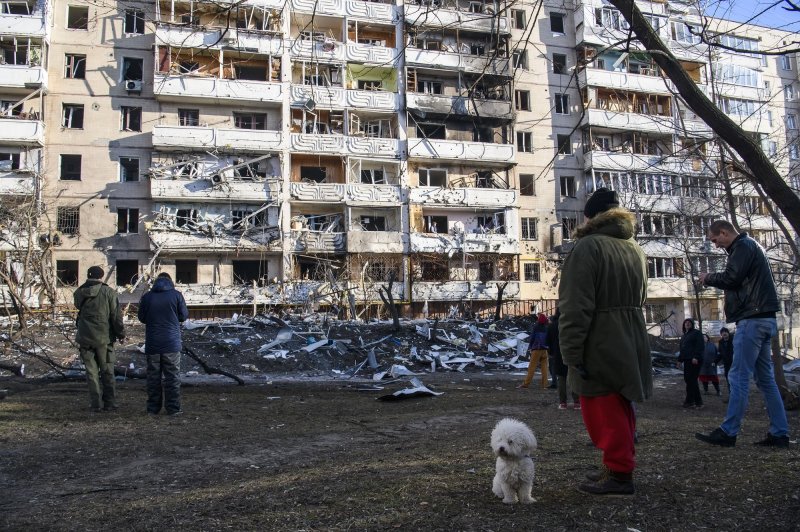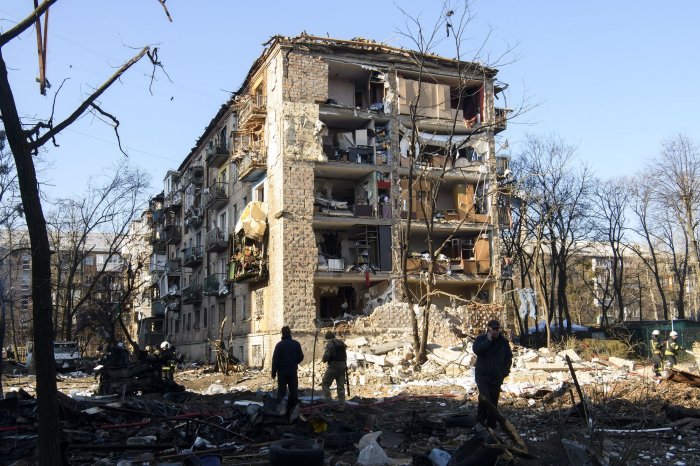1 of 3 | Ukrainians look at damage to an apartment complex in Kyiv it was struck by a Russian bombing attack on Tuesday. Photo by Vladyslav Musiienko/UPI |
License Photo
March 16 (UPI) -- In war, as Carl von Clausewitz told us, "fog and friction" can make even the simplest of operations impossible. Likewise, war is filled with realities, myths and blunders. In the Ukraine war, one reality is most troubling. That is the diametrically opposed views of Western and Russian perceptions of the war, how it is being waged and who is at fault.
Myths confuse and distort reality. Three myths are worth examining regarding Ukraine. The first is the ironclad guarantee of the sanctity of NATO's Article 5. The second is the myth that the 1994 Budapest Memorandum assuring Ukrainian sovereignty was based on Kyiv giving up its nuclear weapons. And last was the myth of Russian military prowess.
Last, blunders lose many wars. Napoleon Bonaparte and Adolf Hitler believed Russia could be defeated. Japan bet that destroying America's battleships at Pearl Harbor would force an isolated United States to sue for peace. And Saddam Hussein gambled, bluffing that the threat of nonexistent weapons of mass destruction would deter the United States from invading Iraq. The United States is not without its share of blunders.
The danger of a clash of realities is obvious. Russians and possibly Belarusians cannot view the extent of carnage being wrought on Ukrainian civilians by this brutal war. Instead, Russians are informed by state-controlled news and propaganda asserting that Western reports are fake news. This complicates any exit strategy Vladimir Putin might pursue short of complete victory that is unachievable. Putin must reconcile this perceptual grand canyon between what his public has been informed and Russian concessions necessary to end this war that contradict this propaganda.
About myths, Article 5 is NOT an automatic declaration of war. Note these relevant parts of Article 5: The parties agree that an armed attack against one or more of them in Europe or North America shall be considered an attack against of them all...individually and in concert with the other parties, (shall take) such action as it deems necessary, including the use of armed force..." With 30 members having to agree, automaticity cannot be absolutely assured.
About the Budapest Agreement, Ukraine's integrity is guaranteed provided Ukraine remains a non-nuclear armed state. After the Soviet Union dissolved, the successor state, the Russian Federation, assumed control of all nuclear weapons, including those in former republics. The Strategic Rocket Force, part of Russia's military, continued to man those systems until they were returned to Russia. Ukraine could not give up a nuclear force it never owned.
Perhaps the largest myth was Russian military prowess. Most stunning was how poorly Russian forces were performing in Ukraine. Putin, along with Defense Minister Sergey Shoigu and Chief of Defense Valerie Gerasimov were praised for reforming the Russian military. While the short Georgian war of 2008 exposed many flaws in Russia's military, its support of Syria in 2015 was seen as a masterful use of force.
The annual May Day parades displayed weaponry that seemed technically advanced that did not perform well in combat. Reports of Russian requests to China for both economic and military assistance, especially drones, if correct, reinforce the myth of Russian military superiority.
About blunders, clearly the Russian attack into Ukraine stands out as a tactical and humanitarian disaster. Over the long term, no matter how and when this war ends, certain irreparable damage will be done to Ukraine and Russia. Whether and how long Putin retains power is unknowable.
A major blunder has been American hostile attitudes toward China when its cooperation may be needed. U.S.-Chinese relations have been frigid since the 2011 "pivot" to Asia and exacerbated by the imposition of trade sanctions and naming China the "pacing threat" for national security planning. The "Baked Alaska" summit last year between China and the United States was confrontational, mirroring one of the few bipartisan areas of agreement in Congress about China's threat.
U.S. national security adviser Jake Sullivan met with China's foreign policy chief Yang Jiechi in Rome to discuss Ukraine on Monday. That meeting did not go well. Sullivan warned China of consequences for aiding Moscow. Yang demurred. And China and Russia denied reports of Moscow's request for assistance. It is doubtful this meeting advanced the chances of diplomacy ending the Ukraine blood letting.
Diplomacy requires creative, constructive and intelligent statesmanship that seems to be lacking in U.S. negotiations. However, the Ukrainian crisis may run so deep that nothing, even clever policies, will change the outcome. If that proves correct, the future is bleak, made more so by these realities, myths and blunders.
Harlan Ullman is senior adviser at Washington's Atlantic Council, the prime author of "shock and awe" and author of "The Fifth Horseman and the New MAD: How Massive Attacks of Disruption Became the Looming Existential Danger to a Divided Nation and the World at Large." Follow him @harlankullman.
The views and opinions expressed in this commentary are solely those of the author.
Ukrainian service members stand beside a damaged building in a residential area after shelling in Kyiv, Ukraine, on March 18. Photo by Vladyslav Musiienko/UPI |
License Photo
















